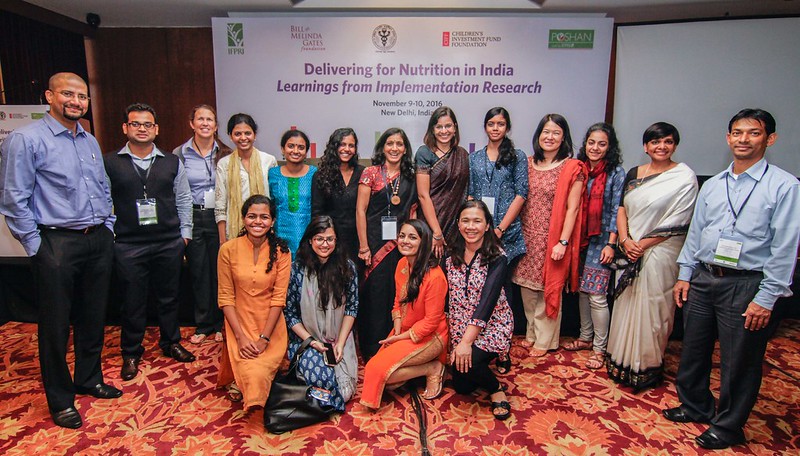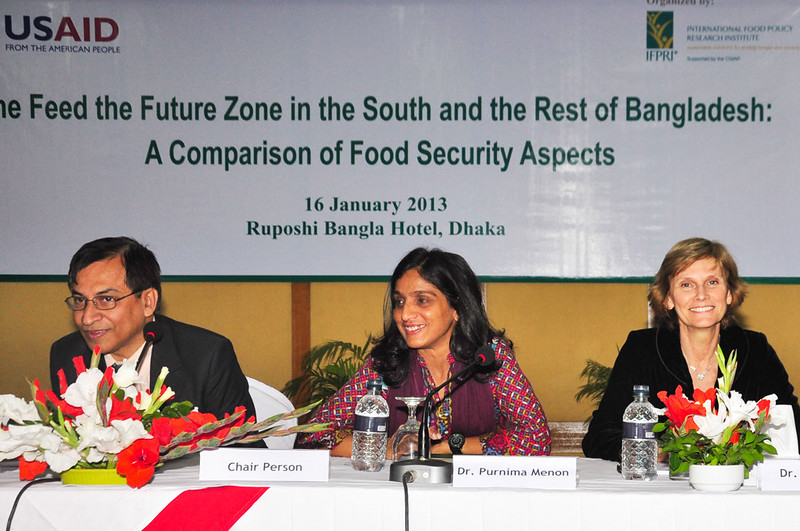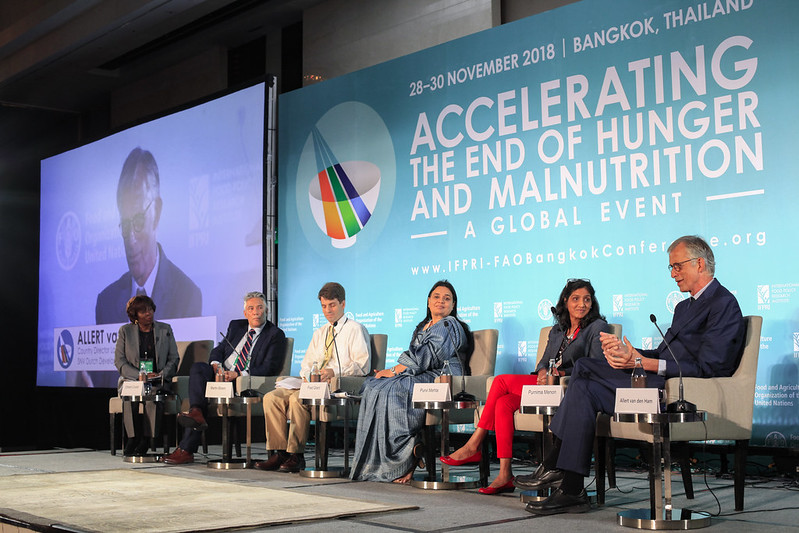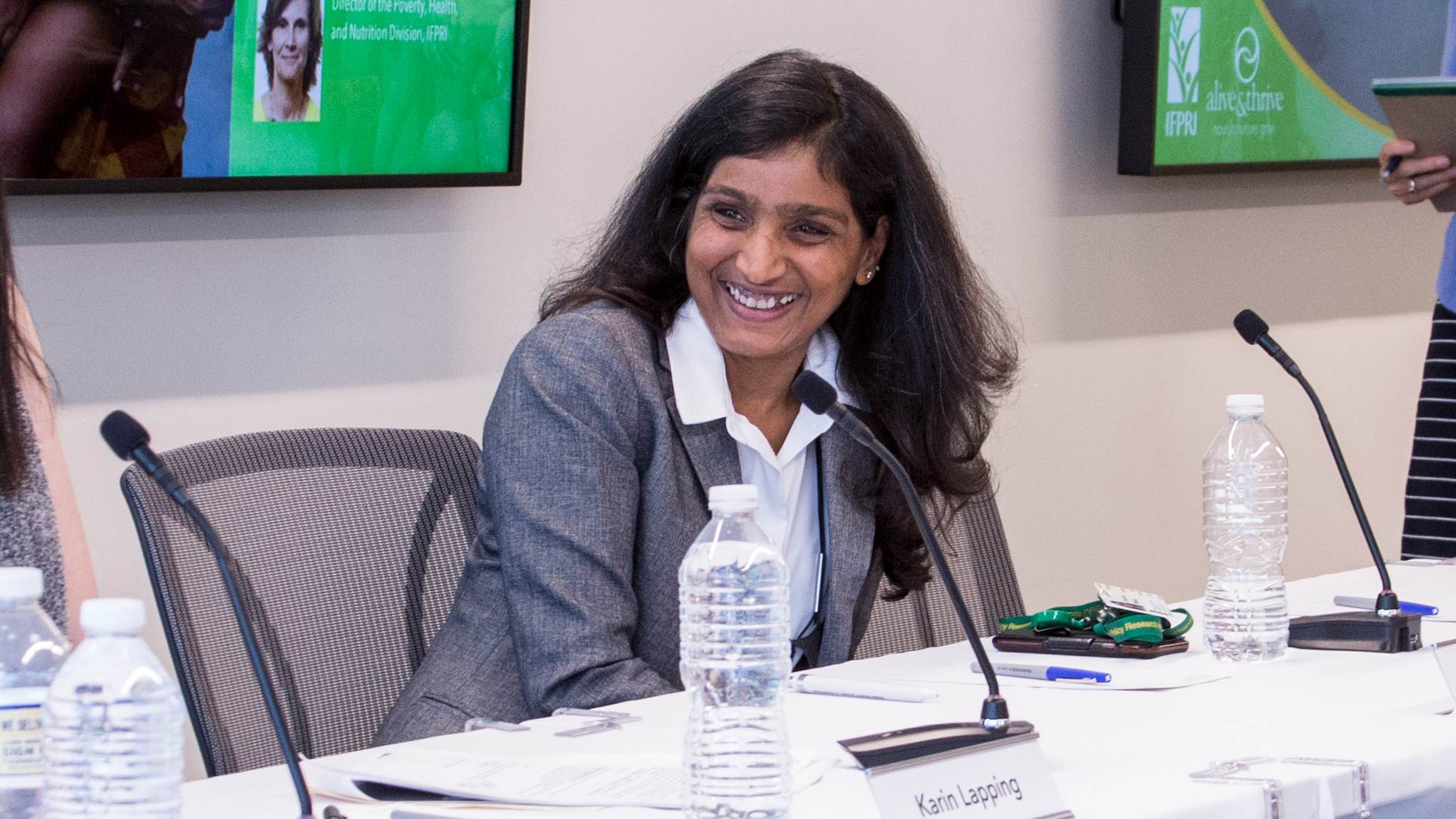Purnima Menon is CGIAR Senior Director for Food and Nutrition Policy and an IFPRI Senior Research Fellow based in New Delhi. She is the theme leader for South Asia Nutrition Programs in IFPRI’s Poverty, Health, and Nutrition Division. In her work in India, Dr. Menon directs POSHAN (Partnerships and Opportunities to Strengthen and Harmonize Actions for Nutrition in India), an initiative to support more use of evidence for nutrition in India. She conducts implementation research on scaling up maternal and child nutrition interventions, including on evaluating large-scale behavior change communications programs in nutrition and health. Dr. Menon has research experience in India, Bangladesh, Ethiopia, Haiti, Viet Nam and Nepal, has published extensively, and invests deeply in research translation in her engagements with policy communities.
To mark the International Day of Women and Girls in Science (February 11)—which this year focuses on sustainability—we asked Dr. Menon about her development as a scientist, her work, and her perspectives on women and girls in STEM.
Purnima Menon
What was your first encounter with science? How did you decide to become a researcher?
PM: I was always interested in science—all the way from middle school—but enjoyed different types of science at different points in my educational career. Biology in the middle school years and physics in high school. Funnily, I studied nutrition as a possible path to hotel school (because I was even more passionate about food than about science!), but once I realized how much of nutrition was about the science, I was hooked. Nutrition covers biochemistry, physiology, and anatomy—the interplay of nutrients with metabolic pathways was absolutely fascinating to me. It also covers food science—food chemistry, for instance, that was super interesting too. Eventually, I connected with the role of social sciences in relation to nutrition, and honestly, I think that was it. The dreams of being a hotelier or restauranteur aren’t quite my dream anymore!
What is the most fulfilling and enjoyable part in your work? And what do you NOT like that much?
I absolutely love working with young colleagues at IFPRI—mentoring and working with junior researchers (research analysts, postdoctoral fellows) has been the most rewarding aspect of my work. I also love connecting our work, like data collection, surveys, and analyses, to the real lives we see in the communities our research serves—knowing that our research can help to improve real programs and policies that affect real people is very rewarding. And I also enjoy that we get to interact with people who make policy decisions—being based with IFPRI in South Asia has meant that connections with people in the policy community are frequent and contribute to co-learning—I learn about their world and they learn about mine, and together, we have a chance to explore how to connect the dots between research and policy.
Bureaucratic processes that take away our time from research or policy engagement are what I enjoy the least about my work, but thankfully at IFPRI, we are an efficient organization, and I haven’t encountered as much bureaucracy in my career as many others have!
 Shawn Sebastian
Shawn Sebastian
With colleagues at the IFPRI-POSHAN Implementation Research Conference, November 2016, New Delhi, India.
What are specific research topics that you are particularly excited about right now? Why?
Nutrition issues facing mothers and babies are always a passion for me—the road is still long to ensuring that women and their babies are well-nourished, and I think it would be hard for me to shake that interest off. In recent years, I’ve had an opportunity to work on adolescent nutrition and to connect the dots between adolescents and the vital importance of transforming food systems to support the future of young people and the planet. With food systems in particular, the One CGIAR process that we are in has helped me appreciate the interconnectedness of the issues we are trying to solve with science—I believe very much in local evidence to support local action, though, so I am moving some of my own research in South Asia toward understanding how food systems work at a local level. I’m keen to explore how local manifestations of food systems are affected by policies and financing at the national and global level and how food systems intersect with other societal systems to shape outcomes for young people, women, and children. There is a lot to learn, a lot to understand and then of course, a lot to do to translate research into informing policies and actions.
What’s the best piece of advice you’ve received in your career in science and who gave it to you?
Oh, gosh, I’ve been so privileged to have had fantastic mentors from around the world in my life. My most steady mentor, [IFPRI Poverty, Health, and Nutrition Division Director] Marie Ruel, has always advised me and indeed mentored me to be relentless about the quality of the research we do and that has been transformative. Marie also taught me that leadership that engages the mind and the heart is what helps people grow in ways that are most fulfilling to them. I also received excellent advice from [Global Alliance for Improved Nutrition Director] Lawrence Haddad years ago on managing people— he advised me never to have more than 5-6 direct reports and that has really helped me work on configuring my own research ecosystem. It really helped me give up control in ways that helped build the careers of others and give others leadership opportunities too.
 IFPRI
IFPRI
With Dr. Marie Ruel (right) at “The Feed the Future Zone in the South and the Rest of Bangladesh: A Comparison of Food Security Aspects” workshop, January 2013, Dhaka, Bangladesh.
Over the years that you’ve been in science and research, what have been the major changes (if any) for women and girls in science?
First, I see a change in women themselves—I have seen more women step up in leadership and step up to lead in their own ways (not in ways defined by a male-dominated world), and in doing so, being new role models for what leadership itself means. I have also seen women themselves come together to create platforms that support women researchers in global health, nutrition, economics, and more—and this too is a sign that women are willing to step up, step together, and ask for more.
Second, there are supportive changes in the ecosystem itself—in many fields, there are increasing opportunities for women and an increasing understanding of the importance of gender diversity in research and in leadership. This has really helped create more space for women, for our voices and our ways of leading and building teams.
Third, I am seeing so many male colleagues, especially those in the global North, lean in and be allies to women in science and research. This is so important to reshape where we are on gender and inclusion too!
What are the key three things that still need to change to improve diversity and inclusion in science and research in general, and to support women and girls pursuing careers in science in particular?
We have such a long way to go on diversity and inclusion in science and research, especially on decolonizing development research. We must walk the talk on this—across fields, across institutes and universities, across everything we do. What’s challenging about this is that it actually requires those of us with the privilege of working with global organizations to step back to give others more power and voice and yet step forward in other ways to reshape how we do our research.
Research funding must change in ways that creates both carrots and sticks to help improve diversity and inclusion. Funding organizations have tremendous power to reshape how science and research is done, and we are beginning to see these shifts, but more will be needed.
Last, but not least, journal editors and publishers and reviewers must play a strong role in strengthening diversity and inclusion in research. Many leading global health journals are playing this card very strongly right now but there are still disciplines and fields where journals’ editorial policies need work to strengthen diversity and inclusion.
 Patrick de Noirmont for FAO/IFPRI
Patrick de Noirmont for FAO/IFPRI
In a plenary session during the “Accelerating the End of Hunger and Malnutrition; A Global Event”, November 2018, Bangkok, Thailand.
Anything you’d like to add that we have not asked yet?
If you’d asked me, 30 years ago, when I decided that nutrition was a path of interest to me, where I would see myself, I would have laughed aloud at the idea that I would be in a leadership role in a global organization. But I want to acknowledge that my journey has been possible because so many people have opened doors for me, have taught me, have mentored me through thick and thin. It has also been because my family—my parents, my husband, my daughter, my parents-in-law—have been so incredibly supportive. So, for me, if we want more women in science, more women in leadership, we need to create more enabling environments around all aspects of their lives—none of us travel this road alone.







